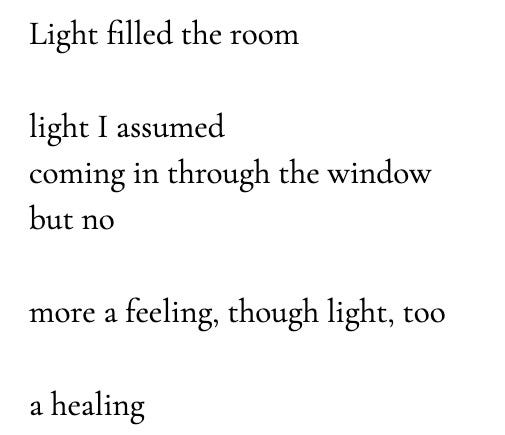poetry pocket: night walk, franz wright.
walking home for a moment / you almost believe you could start again. /and an intense love rushes to your heart, / and hope. / it's unendurable, unendurable.
“Whatever you love, that’s what’s beautiful. You have certain special and private places, and ideal places, you keep inside you, memories of times when, the way you’re constantly in childhood, having experienced the feeling like you’re just about to see through to the way things really should be.”
- Franz Wright, in an interview
little voice,
this week, i would like to take you on a Night Walk with Franz Wright.
but first: an apology. last week, there was no letter to your little voice.
i have no excuse, no reason, no logos: like Wright, I write only when the sun is sent out of me. i write for the rise, for the song:
And just the impulse to sing like this, to find some way of responding. You know, with poetry you’re really close. You’re never far from the most ancient impulses in human beings, which are to like—to say something back or something to the universe—so much awe of it. You have to say something back and in some thought, one way or another. Whitman said, “How could I survive the sunrise if I did not always constantly send sunrise out of me.” See, by the time I finish trying to answer, I forget what you’ve asked me.
a poem, for Wright, was also a making place; a place to wander, a shield, a hand to shake: it was being in love:
“For me, it’s simply a place, an improved actual place to go to, to walk around inside. And I experienced this from very early in childhood, even maybe before writing. But then, when writing started, it gave it a very concrete form—this strange world. Very early, I had the sense of language as being a literal place or somehow doubling everything. If the infinite can be doubled, which it can’t. It’s an impossible mathematical proposition, but that’s what it does. Language doubles the infinite. And then Rilke comes, and he believes that for literally every phenomena in the external world, there is a corresponding inner phenomenon. But what he means is language. That there wouldn’t be any inner life without language, there wouldn’t be any thought.
For me, at first, it was a shield against the world. You know that line by Joyce in A Portrait of the Artist as a Young Man: “Bearing my chalice safely through a crowd of foes?” It was a shield, and it also enriched everything. It made everything twice as good. It did both. It did everything. To me, it was always associated, almost, with the sense of being in love; it was an identical sense. So I always responded to that image in Wallace Stevens about the inner paramour. There’s other forms, like in Kibir—the inner friend. And there’s St. John’s prosody. There’s this person that we could be—that we want to fall in love with and be with and we can never find it. Maybe some people do. I’d like to meet one. I’ll shake hands. But to me, it was like Hart Crane said, I was promised an improved infancy. It was an improved reality and a place. Mark Rothko said the exact same thing—he’d sit in front of a painting for hours—one of those brilliant, late paintings. It’s a place for me to go.”
you can listen to Wright read five of his own poems here, in his own little voice.
i am reminded of Natalie Diaz:
and Wright’s own tender instruction for curious despair:
the questions he asked himself , longing over strange and sore skies:
i will pass by you on monday, with a letter tucked in my pocket. perhaps the night will smell like snow. perhaps it will be a good thing to step outside again.
until then, i wish you, in Wright’s own words, a September Sunflower:
love in unendurable hope,
ars poetica.









So evocative. the night smells like snow. darkness only conceals the light. it exists everywhere. you have to observe and seek out the truth of your days.
This is beautiful, so honest and intimate.